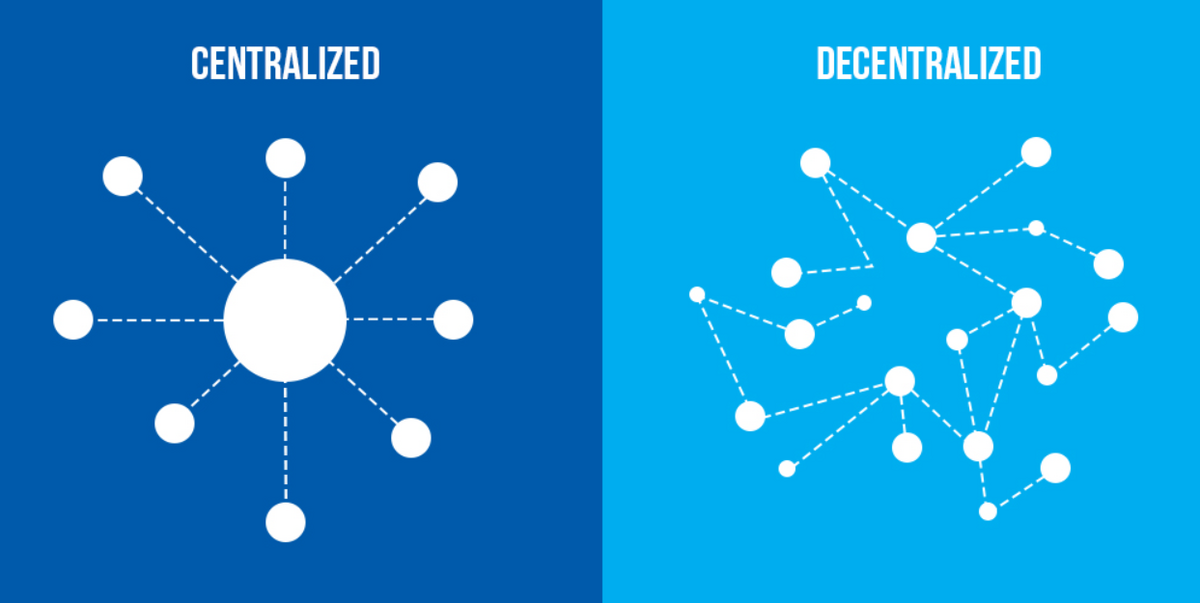
Decentralized storage platforms are causing a seismic shift in how we handle and share information in the Web3 world. It might surprise you, but blockchain technology and cryptocurrency are about more than just Bitcoin and Ethereum prices.
As the world increasingly relies on data, the traditional methods of storing this precious commodity are being challenged. From security breaches and cyber attacks to data loss, centralized cloud storage systems have shown the vulnerabilities that come from single points of failure and centralized control.
Fortunately, there’s an alternative. In this guide, we’ll dive into the nuts and bolts of Decentralized storage networks. These on-chain data centers leverage blockchain technology to offer a more secure, transparent, and efficient way to store data.
Table of Contents
What Is Decentralized Storage?
At this point, almost everyone who’s ever used the internet has a Google account. As you’ll no doubt be aware, Google Cloud storage solutions are convenient for storing your photos, videos, and documents online, making them accessible from any connected device.
Sponsored
This is what we call a centralized storage model. While it’s simple and has a multitude of use cases, centralized storage options are overwhelmingly reliant on Big Tech giants like Google and Amazon.
Why? Imagine the Pandora’s box that would be unleashed if Google got hacked or lost. Half the world’s data, apps, and documents would be at stake, wreaking havoc in our society.

At its core, decentralized storage is a departure from the traditional centralized storage systems we’ve grown accustomed to. Instead of relying on a single entity or server to store data, decentralized storage distributes data across a vast network of nodes.
Sponsored
The magic lies in the blockchain, the underlying technology behind cryptocurrency. Decentralized platforms ensure that data isn’t stored in one central location, reducing the risk of data breaches, hardware failures, and unauthorized access.
On top of that, these distributed peer-to-peer networks grant users complete ownership and control over their data, a feature often missing in centralized systems.
How Does Decentralized Data Storage Work?
The easiest way to imagine a decentralized storage platform is to think of it as a jigsaw puzzle, where each piece of data is stored on a different piece of the puzzle, scattered across the globe. Here’s a closer look at the key principles:
- Fragmentation – When you decide to store a file on a decentralized network, the system first breaks it down into smaller chunks or fragments. This ensures no single node has the complete file, bolstering security.
- Encryption – Each of these fragments is then encrypted, adding a layer of security. This means deciphering meaningful information from a malicious actor would be a Herculean task, even if a malicious actor accesses a fragment. It’s like trying to make a ten-course meal, but you’ve only got the recipe for one dish.
- Distribution – Post encryption, these fragments are distributed across various storage nodes in the network. These nodes can be spread globally, ensuring data redundancy. If one node fails or is compromised, the data can still be retrieved from other nodes.
- Retrieval – When you need to access your file, the system locates the various fragments, decrypts them, and reassembles them. This process is seamless, ensuring a user experience similar to traditional storage methods but with enhanced security.
- Consensus Mechanisms – Blockchain’s consensus mechanisms, like Proof-of-Work or Proof-of-Stake, ensure the stored data remains consistent and unchanged across the network. It’s a way to verify the authenticity and integrity of the data.
- Incentivization – Many decentralized storage platforms incentivize node operators by rewarding them with cryptocurrency tokens. This ensures a robust and active network, as participants are compensated for their storage contributions.
Best Decentralized Storage Systems in Crypto
While they don’t dominate the headlines like Bitcoin, decentralized storage systems have carved a niche for themselves. Powered by blockchain’s immutable nature, these platforms are redefining how we handle data storage in the modern world.
1. Filecoin (FIL)

In the dynamic world of decentralized storage, Filecoin emerges as something of a titan, bridging the gap between decentralized networks and economic incentives.
Filecoin isn’t just a storage platform; it’s a marketplace. It facilitates an open market for storage services, where users can select their desired price and reliability levels, ensuring flexibility and choice.
The platform operates on a simple principle: those who provide storage space earn Filecoin tokens, and those who use the space spend them. This creates a competitive market, driving down prices and elevating quality.
Filecoin employs novel cryptographic proofs, like Proof-of-Replication and Proof-of-Spacetime, ensuring data is correctly stored over time. By creating a competitive marketplace for storage, Filecoin ensures users get the best bang for their buck. On top of that, users can pay different rates to unlock faster retrieval times.
2. IPFS (Interplanetary File System)

While not technically a blockchain, IPFS is still one of the most popular decentralized storage systems.
With greater scalability and storage capacity than blockchain-based platforms, IPFS has been touted as the future of the internet. It aims to replace the traditional HTTP protocol with a peer-to-peer network, making the web more resilient.
Instead of relying on location-based addresses (like URLs), IPFS uses content-based addressing. This means when you request a file, instead of fetching it from a specific server, the system retrieves it based on its content hash, sourcing it from the nearest node. By fetching data based on its content hash rather than location, IPFS reduces redundancy, speeds up the web, and ensures data integrity.
Users like IPFS because every file change or update creates a new hash, allowing users to access previous versions of a file. This helps to provide deeper context and clarity to data management.
3. Arweave (AR)

In the bustling realm of decentralized storage, Arweave shines with its promise of “permanent” data storage. Arweave’s claim to fame is its ability to offer data storage in perpetuity. It’s not just about storing data; it’s about ensuring it remains accessible for generations.
Using a novel structure called the “blockweave” instead of the traditional blockchain, Arweave makes data storage more efficient. Instead of adding blocks linearly, the blockweave intertwines new blocks with old ones, ensuring data permanence.
Arweave’s native token, AR, compensates miners who add new blocks to the blockweave. The unique aspect? Once data is stored on Arweave, the upfront cost ensures it remains there forever, eliminating recurring fees. What’s more, miners are incentivized to add new blocks and provide data when requested, ensuring data availability.
4. Storj (STORJ)

Emphasizing security and privacy, Storj ensures that data isn’t just stored but is locked away securely and privately, away from prying eyes. Your data is actually encrypted before it even leaves your device, ensuring unparalleled privacy.
Storj operates on a decentralized network of nodes run by individual operators worldwide. The platform’s decentralized cloud service, Tardigrade, promises enterprise-grade durability, data security, and performance, with the added benefits of decentralized storage.
In a nod to crypto’s founding ethos, Storj’s codebase is fully open source. Developers are encouraged to inspect, modify, and improve the network architecture. The platform’s native token, STORJ, plays a key role in the ecosystem, compensating node operators for their storage space and bandwidth.
5. BitTorrent (BTT)

Long before the current wave of decentralized storage platforms, BitTorrent was already making a name for itself online and pioneering peer-to-peer data sharing. Its decentralized protocol allows users to distribute data globally, reducing the need for centralized servers and eliminating single points of failure.
With the explosive growth of blockchain technology over recent years, BitTorrent has evolved. Following its acquisition by Justin Sun and TRON, BitTorrent introduced the BTT token and added a layer of incentivization to the network, rewarding users for seeding files.
Instead of relying on a single source, BitTorrent fetches file pieces from multiple peers, optimizing download speeds. BitTorrent optimizes bandwidth usage based on network conditions, ensuring efficient data transfer without clogging the network.
6. Siacoin (SC)

Amidst the vast range of decentralized storage platforms, Siacoin weaves its unique narrative, championing privacy, affordability, and decentralization. The Sia network is a decentralized cloud storage platform that prioritizes user privacy and offers storage solutions at a fraction of the cost of traditional cloud services.
It works like this: Hosts offer their unused storage space to renters. These renters pay in Siacoin to store their files, which are encrypted, split into fragments, and then distributed across the network, ensuring redundancy and security. Sia uses blockchain-based smart contracts to ensure hosts and renters fulfill their obligations. These contracts hold Siacoins in escrow, releasing them once terms are met.
SC, the transactional currency of the Sia network, powers the platform. Whether renting out storage space or seeking to store your data, Siacoin facilitates these interactions, driving the platform’s economic model.
Decentralized Storage Solution Pros and Cons
The digital landscape is ever-evolving, and as decentralized storage providers gain traction, it’s crucial to weigh their advantages against potential drawbacks. Let’s dissect the pros and cons to provide a balanced perspective:
Pros
- Enhanced Security – With data fragmented and distributed across a vast network, the risk of data breaches is significantly reduced. Plus, encryption ensures that it remains indecipherable even if data is accessed.
- Data Redundancy – Storing data fragments across multiple nodes ensures that even if some nodes fail, the data remains intact and retrievable from other nodes.
- User Control – Decentralized file storage returns data ownership to users. Unlike centralized systems, where the service provider has overarching control, decentralized storage users dictate terms, ensuring data privacy.
- Cost-Effective – With multiple hosts competing in a free market, storage prices are often lower than traditional cloud services.
- Censorship Resistant – Decentralized storage systems, by their very nature, resist censorship. With no central authority, enforcing data removal or blockage is challenging.
Cons
- Complexity – For the average user, the intricacies of blockchain and decentralized systems can be daunting, hindering widespread adoption.
- Scalability Concerns – While decentralized systems ensure data redundancy, they might sometimes lag in retrieval speeds compared to centralized counterparts.
- Early Stage – Many decentralized storage platforms are still in their infancy. This means potential bugs, clumsy user interfaces, and evolving features.
- Economic Viability – While hosts compete to offer competitive prices, the volatility of the crypto market can impact storage costs.
- Data Loss Risk – If not enough nodes maintain a particular piece of data and it gets lost, there’s a small risk of data loss.
On the Flipside
- While it may be fun to speculate on what might happen if centralized storage systems like Google or Amazon were compromised, the chances of this eventuating are minimal. Decentralized storage platforms are cumbersome for the uninitiated, and most people will always prefer a simpler solution.
Why This Matters
Despite being often overlooked next to the colossal fields of DeFi and NFTs, decentralized storage solutions are one of the most fascinating emerging use cases of blockchain technology.
FAQs
On average, decentralized storage is cheaper than centralized storage by around 78.6%, as per Coingecko data.
Filecoin is the largest decentralized storage network in the blockchain industry.
No, Dropbox is a centralized company.
Also called decentralized storage, Web3 storage is a method of storing data online using a distributed network free from centralized authority.
